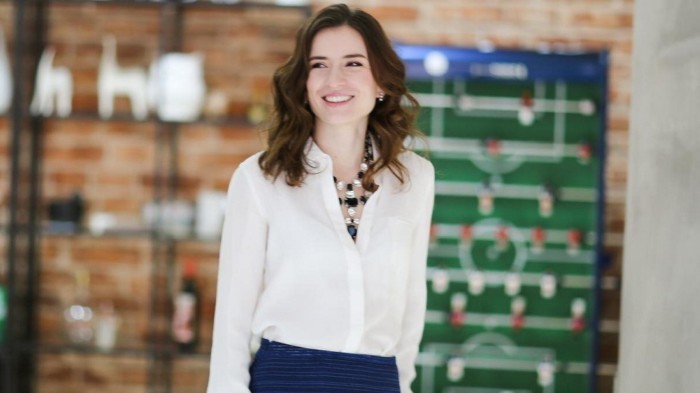After Daria Rebenok and her husband relocated to the US some years ago, friends and relatives in their native Russia started to make specific requests for the couple’s next visit home.
They would ask the pair to buy for them high-end or luxury items that were unavailable in Russian stores, particularly technology such as the latest iPhones.
“The behaviour is very common in eastern Europe or Latin America,” Rebenok says. “All our friends from different countries were doing the same.”
The ad hoc business evolved into start-up Grabr, launched in 2016 and billed as the best way to buy products that are unavailable or too expensive in the buyer’s country. Goods are purchased by travellers who then deliver the requested item to the buyer. The traveller is then reimbursed and paid a commission. Eight years on, Grabr has about 100,000 active users. Despite it not explicitly saying so on its website, the company does not operate in Russia, Rebenok says, due to sanctions and export controls connected to the war in Ukraine.
The emergence of such services that are part courier and personal shopper comes as retailers look for new ways to expand their reach and fill the gap left by the lingering effects of the pandemic. Through the likes of Grabr, as well as rivals Sherpals and AirWayBill, they can increase sales by in effect outsourcing some international shopping to businesses that will also take on any friction and administration on the supply side.
Visitor numbers from China, a leading tourist spending cohort, have yet to rebound from the levels before Covid hit. While the number of European tourists visiting US metropolitan areas was at 92 per cent of pre-pandemic levels, Asian tourism had only returned to 72 per cent, according to data from real estate company CBRE in February 2024.
As such, the much-valued Chinese traveller looking to splurge on luxury goods remains elusive. Economic Intelligence Unit data showed there were 101mn trips across the Chinese border in 2023, just 60 per cent of the 2019 tally.
However, a service such as Grabr can facilitate the sale of a luxury handbag or an expensive pair of shoes in Berlin without anyone in Beijing needing to reach for their passport.
The company’s business process is straightforward. Shoppers post order requests on its website or app, and travellers make offers to fulfil the job. Buyers pay upfront for the product as well as the traveller’s fee, with Grabr taking a cut that varies depending on the value of the item. Handovers always take place in a public setting, after which the traveller receives their fee.
Rebenok supplied examples to the Financial Times which showed a $10.94 or 6.1 per cent fee on a pair of AirPods costing $179, and $1.82 (or just over 20 per cent) on a $8.97 bottle of Vitamin D supplements.
“We recommend a reward for the traveller based on historical bidding data to deliver electronics versus sneakers, for example, but it’s also based on scarcity and urgency,” says Rebenok.
The US is the largest source market for items, with Grabr’s business increasing around big promotions and the launch of new products by companies such as Apple.
“The US economy is driven by constant sales and discounts: Columbus Day, Veterans Day. Any kind of sale like Amazon Prime Day, we see a spike in activity,” Rebenok says.
She adds: “When new iPhones appear, everyone wants them.”
The appeal of Grabr is that it offers transaction security, while also protecting customers from bilking as there is no direct exchange of funds. Of course, imported items can trigger taxes at customs, depending on the value or jurisdiction.
Grabr does not require its users to pay them by, say, holding back the release of funds until a photograph of a tax form has been uploaded.
Rebenok offers a familiar Silicon Valley defence. “It’s the traveller’s responsibility to collect taxes and report them. At the end of the day, what we do is provide information on that and it’s the user’s decision whether to comply with it or not,” she says.
Tatiana Menshenina, a partner at Withers UK Litigation and Arbitration team, says that if the service is used to move goods between two non-sanctioned countries, there’s no legal issue as long as the traveller pays required customs duties. If they contravene sanctions, tax duties or any other import rules, however, it could result in illegality. “We think that’s why Grabr tries to shift responsibility for being compliant on to the individual users.”
Rival AirWayBill operates in much the same way. The Spain-based company was formed in 2017 by Saudi entrepreneur Khaled Sehly and entrepreneur Ana Morro, who now handles day-to-day operations.
Morro says AirWayBill has about 60,000 active users, and that its most common requests are San Francisco to New Delhi and London to Cairo. They are most often looking for gadgets, especially phones, but handbags and watches are also key items, as is baby food.
“It’s specific products that you don’t have access to, ones that are very much needed or in scarcity,” Morro says.
AirWayBill also has heavy intraregional use within the Middle East. One homesick user successfully requested a cake be brought from one side of Saudi Arabia to the other.
AirWayBill’s fees are less opaque than Grabr’s. “The shopper adds a minimum of 10 per cent of an item’s value as a bounty for the traveller, and can increase that for a rush,” Morro says. “And the platform will take 20 per cent of this fee or 2 per cent of the item’s value.”
There is also no requirement to prove payment of taxes on transactions, though users are reminded of those obligations. “For the moment, you don’t need to prove it, but we encourage all our users to pay and consider these regulations before accepting,” says Morro.
Some services focus on specific sectors. London-based Luminaire was launched two years ago by a team that includes Sukeena Rao, previously a personal shopper with Harvey Nichols and Harrods, and Olivia Scanlon, a former lawyer and hedge fund manager.

It is aimed at the world’s wealthiest, in effect acting as an on-call personal stylist with global reach. That might involve identifying an item that is out of stock in London but available at a store in Paris, then hand-carrying it to a client, or in effect bringing the entire boutique to their home.
“In India, there are issues in that market with limited product availability, and we had a very, very high-profile wedding there,” Scanlon explains. “So we did an entire curated edit of probably 100 outfits — shoes, handbags, clothes — and took them all over to do the styling appointments and see what the client wants.”
Another client at a wedding in Monaco decided she wanted a different dress at the last moment. “It was in Paris, so we went over to collect it and took it to Monaco ourselves.”
Scanlon says her core customers use Luminaire because it is convenient. The cost of shipping high-end luxuries is prohibitive and returning them is time-consuming. The company’s on-call, globetrotting stylists handle not only the aesthetics but the logistics and paperwork. The costs for its services are on a sliding scale, says Scanlon, and a membership model, with annual charges from £5,000 to £20,000, plus onboarding fees of £5,000 to £10,000. There are additional fees per item, depending on the tier level of member and scarcity.
“We can bring a huge bulk of products to them which they can try on there and then, and then have someone else deal with the process of getting rid of whatever they don’t want afterwards.”
They also offer clients the chance to browse the racks beyond one country, says Scanlon. “Once we locate an item in a different number of places, we advise them on the best place to buy it. It may be that an item takes longer to ship from another jurisdiction, but it means they won’t have to pay as much,” she adds. “Everyone loves a deal.”
Source link









